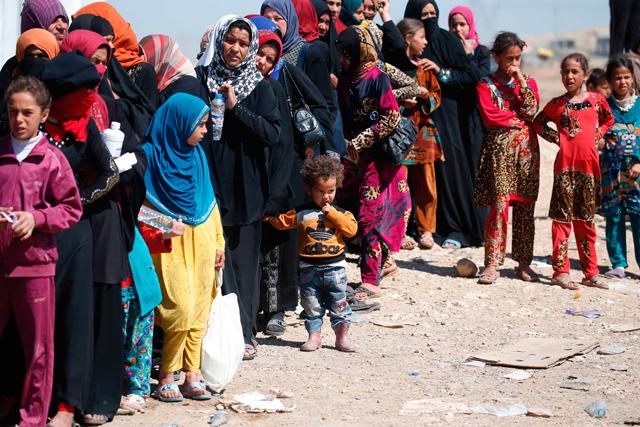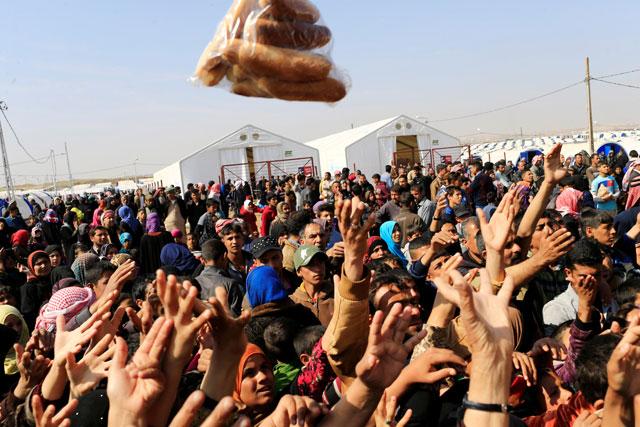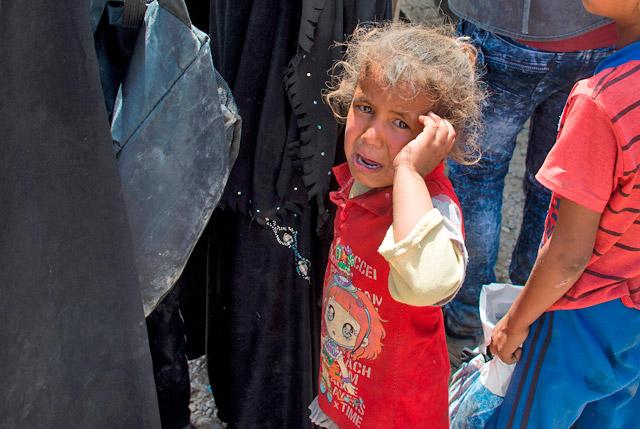You are here
Mosul humanitarian crisis deepens as displacement peaks
By AFP - Apr 07,2017 - Last updated at Apr 07,2017

Iraqis, who have fled the city of Mosul due to the ongoing fighting between government forces and Daesh, wait to receive food in the western part of the city on Thursday (AFP photo)
HAMMAM AL ALIL, Iraq — The fighting in west Mosul has forced up to 15,000 people to flee their homes every day recently, straining humanitarian resources and leaving many in very difficult conditions.
At the Hammam Al Alil camp for the displaced south of Mosul, hundreds of haggard-looking civilians spill out of buses escorted by the security forces all day long.
The camp is a screening site and a gateway for some who will then board other buses and taxis to look for accommodation in other camps or with relatives in "liberated" east Mosul and neighbouring areas.
But others, often among the most needy, stay at the camp and move into tents with relatives or neighbours, sometimes three or four families crammed into the same 10-metre by 4-metre tent.
"There are four families in this tent, about 30 people sleep in it," said Marwan Nayef, a 25-year-old from west Mosul, as a dozen children stood around him or peeped from behind the tent's tarpaulin door.
"Sometimes, it's not big enough so the men go to sleep in a friend's tent. I'm currently sleeping in my brother's tent," he said.
A few alleys down in the camp, whose population has soared to around 30,000, Shahra Hazem holds her 16-month-old hydrocephalic son in her arms.
"He needs an operation, there's water in his head, but there is just no help available. I tried to take him to another camp but they wouldn't let us in," she said.
According to the United Nations, at least 400,000 people have been displaced since the Iraqi security forces launched a huge offensive against the Daesh terror group's Mosul stronghold on October 17.
Civilians increasingly exposed
The majority of those who had to flee their homes did so during the most recent phase of the operation, which started on February 19 in the half of the city that lies west of the Tigris River.
In Hammam Al Alil camp, massive queues of civilians form at midday to receive a helping of rice and sauce from a catering tent, many of them barefooted children who then sit on the gravel to devour their ration.
Some fetch food from outside the camp, others from an informal market that opened on the other side of the fence.
One boy was reselling mats his family received in UN emergency kits to buy cheap chocolate-flavoured wafers from the market.
A woman carrying her daughter ran into neighbours from Mosul and told them of how she and her family survived an air strike that demolished their house.
“Daesh set up a machinegun position in front of our door so the security forces fired back... Luckily, we were all on the ground floor,” said the woman, wearing a bright green dress.
“Some of our neighbours tried to flee yesterday and the security forces shot at them because they thought they were with Daesh. This is happening a lot,” she said.
Most of the residents of east Mosul stayed home during the first phase of the offensive but Daesh resistance has been fierce in and around the Old City in west The security forces have been evacuating as many of them as possible but the UN says 400,000 remain trapped in the Old City.
“What people tell us when they flee is of entire homes being destroyed, so we get anecdotal reports of quite a dramatic level of destruction,” said Melany Markham, of the Norwegian Refugee Council. In the worst such case so far since the Mosul offensive began nearly six months ago, dozens of civilians are believed to have been killed in an air strike conducted by the US-led coalition.
The Iraqi security forces have nonetheless recently reiterated their call on Mosul residents to stay home, dropping thousands of leaflets over the city with messages to that effect.
Markham said she was confident in the aid community’s ability to adapt to even greater needs should the civilian exodus intensify in the coming weeks but warned that the humanitarian response also depended on funding.
During a visit to a camp southeast of Mosul last week, UN chief Antonio Guterres complained that the world’s support for Mosul was woefully inadequate.
“We don’t have the resources that are necessary to support these people and we don’t have the international solidarity that is needed,” he told reporters.
Related Articles
HAMAM AL ALIL, Iraq- A sea of tents stretches to the horizon at a camp for displaced near Mosul but Ahmed Hassan says he and 17 relatives ha
HAMMAM AL ALIL, Iraq, — Fear and hunger are driving an ever-growing number of Iraqi civilians into a camp in Hammam Al Alil, where they shar
ERBIL, Iraq — Aid officials in Iraq said they were "gravely concerned" about the fate of about 1,400 foreign wives and children of suspected
















